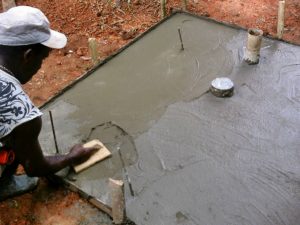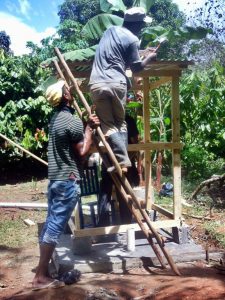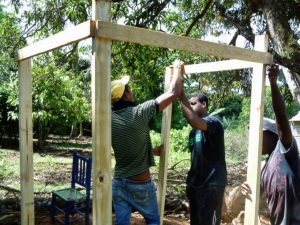This project is made possible through the partnership of WATER CHARITY and the NATIONAL PEACE CORPS ASSOCIATION. ![]()
 Location
Location
This project summary has been redacted for security reasons to omit the specific project location.
Xx Xxxxxxx, Peralvillo municipality, Monte Plata province, Dominican Republic
Community Description
The rural community of Xx Xxxxxxx is comprised of 4 smaller communities or sectors: Centro Xxxxxxx, Los Ferreles, Pekin, and Barrio Nuevo. All communities, with the exception of Centro Xxxxxxx, are of very low-income status, as indicated by the survey conducted by health promoters and the Peace Corps Volunteer.
The majority of the 24 families participating in this project reside in a small community across the river, effectively cut off from the other communities during the rainy season. There is little access to resources, such as trash removal, health services, and colamados (local general stores), and all houses, with the exception of one, are wood and zinc constructions.
The community borders a river and cacao trees like many of the other communities. Furthermore, 92% of the people living there are illiterate and have no steady form of income, with income relying heavily on cacao harvests. Years ago, the community was known for prostitution, and as such still carries the stigma.
Many families have little to no form of education, and still practice unsafe WASH practices, such as drinking river water, not using chlorine to sanitize their water, not washing their hands, and using a nearby brush and river areas for a bathroom.
Problem Addressed
This project will be carried out in a low-income rural community, with a population of 800, where the residents have very limited access to latrines.
 For this project, the committee has selected 24 families, who are dedicated to the project and are actively participating in the community meetings.
For this project, the committee has selected 24 families, who are dedicated to the project and are actively participating in the community meetings.
All 24 families have no form of a bathroom, with 96% of the families having children <5 years in the house, and latrine construction is a top priority.
Project Description
This project is to build 24 new Ventilated Pit Latrines in order to increase the hygiene and sanitation health of the community. The latrine design consists of a concrete floor over a pit, with a wood and zinc structure on top for privacy.
The “Comité de Sanitarios” or “Latrine Committee” of 4 community health promoters and three community members will work to construct the latrines.
The committee will be responsible for the logistics and coordination of the project, with the community members that represent each sector of the community having the responsibility of communication to families and scheduling of construction for the local mason.
Each family will construct its own pits for the latrine, along with providing food for all construction days and the cost of manual labor for the mason.
Water Charity funding will be used for buying all necessary materials and equipment to build the latrines.
The health promoters have been holding group meetings in each community where they have made attendance mandatory for all families interested in the project. At these meetings, the health promoters are giving educational health trainings to the families to further educate them on health promotion and disease prevention, as well as how to prepare for the project.
 Project Impact
Project Impact
137 people will benefit from the project.
Peace Corps Volunteer Directing Project
B. Bidwell
Monitoring and Maintenance
Through the training of the contractors and community members, the community will be able to continue constructing latrines for decades to come. Also, the experience the committee and community members gain from the project will allow them to lead future projects.
In addition, the mason and trained community members will be able to conduct repairs to the latrines, if needed in the future, thereby increasing their longevity for the families.
Finally, through the educational health training facilitated by the health promoters, they are teaching healthy practices that can be carried out by the families and will be continually taught to the next generation, further contributing to a reduction of disease transmission and increasing the sustainability and long-lasting effects of this project.
The health promoters will be conducting monthly checkups and assisting families with any problems, concerns, and further education at monthly meetings in the community.
Comments
A sanitary bathroom is not only a vital need but also a basic amenity everyone should have the right to. With a proper bathroom, fecal-oral transmission can be drastically reduced, preventing diseases such as diarrhea and cholera, which can be dangerous to children and the elderly.
This project will have a long-lasting impact in the community by helping to combat diarrhea and increase the overall health and sanitation in the community. For many families that do not have a sanitary bathroom, this project will greatly increase the overall health and well-being of the families.
In addition, the project will provide leadership opportunities for community members and further skills development for the health promoters through the educational training and demonstrations they prepare and give.
Funding
This project has been funded through the generosity of the Paul Bechtner Foundation.